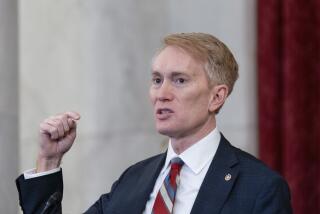Defections, objections stall talks on bailout
Prospects for quick congressional action on the nation’s worsening financial crisis dimmed Friday, with House Republicans continuing to balk, some House Democrats making new demands of their own and legislative strategists suggesting action may not come until next Wednesday
House Republicans, whose objections derailed the week-long talks over President Bush’s original $700-billion bailout plan, insisted that they wanted an agreement and understood the urgency of the situation.
“We’re going into these negotiations with every intention of having a real negotiation, of having a bill that House Republicans can vote for and solving this problem as quickly as we can,” Minority Whip Roy Blunt (R-Mo.), the newly designated negotiator for the House Republicans, said Friday.
But there were no meetings above the staff level, and it was not clear what specific changes House Republicans wanted to see in the plan spearheaded by Treasury Secretary Henry M. Paulson.
Blunt’s statement said only that the final rescue plan should include “some additional free-enterprise principles.”
Stocks posted modest gains Friday, but the continuing frailty of the financial system was demonstrated by the government-brokered seizure and sale late Thursday of Washington Mutual Bank, the biggest U.S. bank failure in history. It was just the latest in a series of collapses of powerhouse financial firms, including Wall Street investment bank Lehman Bros. Holdings Inc. and insurance giant American International Group.
Citing the fragile condition of the financial markets, House Speaker Nancy Pelosi (D-San Francisco) sought to keep the pressure on Congress by ordering a rare weekend session.
“We will not leave until legislation is passed that will be signed by the president,” Pelosi said. “The markets need a message from us that we’re acting.”
Administration and congressional officials have set late Sunday as a deadline, worried that the volatile financial markets will go into full panic if there is no deal before trading resumes next week.
But with no clear consensus on a deal emerging, and with the Jewish holiday of Rosh Hashanah falling on Tuesday, some Capitol Hill aides speculated that a final deal may not come to a vote before Wednesday. The negotiations over the rescue plan were clouded Thursday by the emergence of a Republican-backed proposal for a government-organized insurance program to be paid for by Wall Street. Proponents, who also called for further deregulation and more tax breaks for business, said their approach would not require billions of taxpayer dollars.
House Minority Leader John A. Boehner (R-Ohio) spoke favorably of the insurance plan Thursday, although on Friday he appeared to be backing away from it, saying, “There are a lot of options.”
The apparent contradiction triggered speculation that the current impasse reflected politics more than policy.
“The Republicans want to drag their feet and get some changes so they can say the bill looks better for taxpayers,” said Greg Valliere, an independent political strategist for the financial services firm Stanford Group Co. “The key political issue is this: Who wants to take ownership of this thing?”
But with e-mails and calls to Congress running overwhelmingly against the deal, House Republicans said they were working to make sure that ordinary Americans would not be fleeced by a rescue plan widely seen as benefiting Wall Street and not Main Street.
“We believe that America is on the edge of an economic crisis, and we believe that we need to act and need to act quickly,” Boehner said. But, he added, “We will not agree to a bill that sells taxpayers out.”
The insurance plan has been touted by Republicans as a way to protect taxpayers, although experts were divided over whether it would work.
The lead author of the insurance plan, Rep. Eric Cantor (R-Va.), told MSNBC that the plan would still require the government to buy up the toxic mortgage-related securities that are at the heart of the current crisis.
“As far as the very exotic securities, as far as those that are sliced and diced and very complicated, of course we are not going to be able to assess the risk there. Those are the securities in which we should have the purchase component that Mr. Paulson is talking about,” Cantor said.
Paulson said such insurance might help prevent future panics but would not address the current problem. In his initial proposal a week ago, Paulson asked for authority to buy up to $700 billion of Wall Street’s unwanted mortgage-related securities.
By removing those assets from the ledgers of banks and other financial institutions, establishing some sort of price for the troubled securities and pumping cash into the panicky system, the administration said its plan would unfreeze credit and spur a resumption of normal financial activity.
Negotiations over the plan went forward all week, and Paulson had accepted an array of modifications designed to ensure outside oversight of the program, protect taxpayers, cap compensation for executives whose firms participated, and dole out the money in three stages instead of all at once.
As talked bogged down Friday, Bush spoke from a podium outside the Oval Office in an effort to buy negotiators some breathing room.
“Any time you have a plan this big, that is moving this quickly, that requires legislative approval, it creates challenges,” Bush said. “Members want to be heard. They want to be able to express their opinions, and they should be allowed to express their opinions.”
“There are disagreements over aspects of the rescue plan, but there is no disagreement that something substantial must be done,” he added. “The legislative process is sometimes not very pretty, but we are going to get a package passed. We will rise to the occasion. Republicans and Democrats will come together and pass a substantial rescue plan.”
Stocks initially sank on news that the plan was stalled but began to recover after Bush predicted a plan would be enacted. The Dow Jones industrial average ended the day with a gain of 121.07 points, to 11,143.13.
But it was clear that Bush, who played host to a contentious and inconclusive meeting at the White House on Thursday, had little influence over members of his own party and hence, over the shape of the emerging deal.
Democrats were quick to try to capitalize on the GOP’s divisions. “President Bush, for the sake of America, please get your party in line,” Sen. Charles E. Schumer (D-N.Y.) said in a speech on the Senate floor. “Get the House Republicans to be more constructive.”
As the delay continued, however, some of Schumer’s Democratic colleagues began to express reservations of their own. House Democrats unhappy with the bailout also applauded the stalemate.
A self-styled “Skeptics Caucus” met for the second time Friday to discuss changes they would like to see in the plan, including a smaller dollar amount. About 25 lawmakers and 30 staffers attended the meeting, said Rep. Brad Sherman (D-Sherman Oaks), who leads the group.
“I’m glad that the juggernaut got slowed down, and it got slowed down by Republicans,” Sherman said. “Now we have a chance to pass a much smaller bill by Sunday or to not pass anything until after Rosh Hashanah.”
--
maura.reynolds@latimes.com
nicole.gaouette@latimes.com
Times staff writers Peter G. Gosselin, Bob Drogin, James Gerstenzang and Johanna Neuman contributed to this report.
More to Read
Start your day right
Sign up for Essential California for news, features and recommendations from the L.A. Times and beyond in your inbox six days a week.
You may occasionally receive promotional content from the Los Angeles Times.







